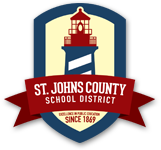When someone experiences emotional difficulty, it may affect their general daily functioning. For students, this is often evident in academics. Frequently school-related problems may be symptomatic of those troubles. School-based mental health professionals can assist families connect to community mental health resources.
School Counselors
Counseling and guidance programs have undergone an evolution over several decades and are critical to help prepare students to meet the challenges of the future. St. Johns County School District’s school counselors promote academic, college and career readiness and social/emotional development for all students.
Classroom Guidance Lessons: Helps students understand themselves and others. Through classroom guidance, school counselors help students develop peer relationships; effective social, decision-making, and study skills; effective communications, conflict resolution, and coping strategies; and more.
Individual Student Planning: Helps students set goals, establish academic and career plans, understand their own strengths and weaknesses, and prepare for the transition to the next stage of their life.
Responsive Services: Assists students with particular needs such as adjusting to a new school, coping with grief following a crisis, and dealing with substance abuse or other risky behaviors. These services are provided through individual and small group counseling, peer facilitation and consultation, and referrals to professionals trained in mental health, welfare, and other specialties.
System Support: Enhances school climate and relationships among members of the school community. School Counselors coordinate parent outreach services, community support services, and consultations with other faculty and staff.
For more information and contacts, please visit the Guidance & Programs of Choice Department website.
School Social Workers
- Enforcement of compulsory school attendance laws
- Early identification of patterns of nonattendance along with analyzing causes of nonattendance
- Promotes positive student and family attitudes toward attendance and education
- Home visits and outreach services to students and families
- Consults with teachers, administrators, etc. to provide insight and understanding regarding a child’s needs and behaviors
- Completes social development histories to assist with a student’s psycho-educational evaluation
- Serves on the MTSS at each school to assist students experiencing attendance, academic, social, emotional, and/or health problems
- Participates in staffing with school personnel, parents, and community agencies to provide coordinated evaluations and planning for students
- Coordinates services with other agencies to develop a comprehensive service delivery system within a multi-disciplinary team setting
- Refers and helps families access community, medical, mental health, and social welfare services
- Crisis prevention and intervention
- Staff development and in-service training
- Serves on community agency committees/boards to promote educational policies and strengthen department alliances within the community
- Advocacy for students, parents, and the school system
For more information and contacts, please visit the Student Services Department website.
School-Based Mental Health Counselors
When a student experiences emotional difficulty that limits the student’s ability to participate in the education process, the student may benefit from counseling to overcome the difficulty. Counseling typically requires that the student have the ability to discuss her/his feelings and follow a train of thought to make connections regarding coping strategies. When a student is not making the progress expected from school level counseling or the student’s difficulty is beyond what is typically provided by school level counselors, the student may be referred for counseling from a district mental health counselor. Referrals verify that less intensive counseling services have been exhausted or would be inappropriate. The district mental health counselor collaborates on an “as needed” basis with the student’s support network (school, home, community). When the student has made sufficient and consistent progress, the more intensive support is faded back to the school level. If you have already spoken to your child’s school and have further questions about school-based mental health counseling, please contact your student’s school counselor.
If you believe your child is in need of counseling, please contact your student’s school counselor or the school social worker.
School Psychologists
School psychologists are uniquely qualified members of school teams that support students’ ability to learn and teachers’ ability to teach. They apply expertise in mental health, learning, and behavior, to help children and youth succeed academically, socially, behaviorally, and emotionally. School psychologists partner with families, teachers, school administrators, and other professionals to create safe, healthy, and supportive learning environments that strengthen connections between home, school, and the community.
School psychologists provide direct support and interventions to students, consult with teachers, families, and other school-employed mental health professionals (i.e., school counselors, school social workers) to improve support strategies, work with school administrators to improve school-wide practices and policies, and collaborate with community providers to coordinate needed services. They help schools successfully:
- Improve Academic Achievement
- Promote Positive Behavior and Mental Health
- Support Diverse Learners
- Strengthen Family-School Partnerships
- Improve School-Wide Assessment and Accountability
- Monitor Individual Student Progress in Academics and Behavior
For more information and contacts, please visit our School Psychologists web page.
Community-Based Mental Health Counselors
The agencies below have agreements with the St. Johns County School District to provide counseling services to SJCSD on campus. If you believe your child is in need of counseling, please contact your student’s school counselor or the school social worker.


